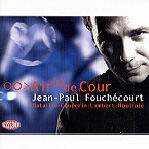Lovers of pure, unadulterated melody and a clear, expressive, silver-toned tenor voice will really enjoy this disc. It’s the first in a series of three devoted to the art of the French song, “from the air de cour to the romance.” As for the “air de cour”, it’s a particular genre of song in which words are prime–and consequently, melody is the all-important messenger. Accompaniments are the simplest–often just a lute or other plucked stringed instrument. Themes tend toward the torments and pleasures of love (sometimes in very risqué language) often involving shepherdesses, and over the centuries evolved to include other topics, such as laments, the joys of drinking (“air à boire), or comments on contemporary events. Beginning with Robert Ballard’s compilation in 1570, many such collections were published during the next 200 years. Any composer worth anything made serious contributions–sometimes many volumes-worth–to the repertoire. Except for Lully and Couperin, most of the composers’ names here will not be familiar–Attaingnant, Moulinié, Richard, etc.–but there’s no shortage of first rate melody and evocative text setting. The varied accompaniments are all absolutely appropriate to the music–allowing, as required, the words to be heard and their meaning understood.
Of course, our ease in understanding the songs is largely owing to tenor Jean-Paul Fouchécourt’s facile technique and natural, unaffected style. What a lovely voice! Although he sings in what most listeners would call a tenor range and timbre, in some of the songs he’s technically working in what’s known as “haute-contre”, a high tenor for which composers such as Lully wrote many parts. There’s one rather odd insertion in the program–a 20th-century song by Georges Brassens that with its modern European-pop-oriented style at first seems out of place. But then you realize that this could be the modern equivalent of the older air de cour, and it makes perfect sense. Besides, it’s a catchy little tune with a nifty guitar accompaniment that just dares you not to like it. The final song, Couperin’s “Zéphire”, allows Fouchécourt to demonstrate his impressive skills in ornamentation. The sound is just about perfect. A pleasant surprise in every respect.
































